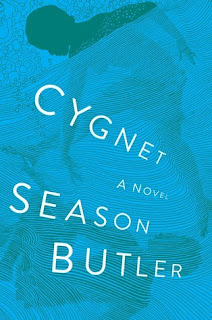Cygnet
Summary (from the publisher): An utterly original coming-of-age tale, marked by wrenching humor and staggering charisma, about a young woman resisting the savagery of adulthood in a community of the elderly rejecting the promise of youth.
“It’s too hot for most of the clothes I packed to come here, when I thought this would only be for a week or two. My mother kissed me with those purple-brown lips of hers and said, we’ll be back, hold tight.”
Seventeen-year-old Kid doesn’t know where her parents are. They left her with her grandmother Lolly, promising to return soon. That was months ago. Now, Lolly is dead and Kid is alone, stranded ten miles off the coast of New Hampshire on tiny Swan Island. Unable to reach her parents, and with no other relatives to turn to, Kid works for a neighbor, airbrushing the past—digitally retouching family photos and movies—to earn enough money to survive.
Surrounded by the vast ocean, Kid’s temporary home is no ordinary vacation retreat. The island is populated by an idiosyncratic group of elderly separatists who left behind the youth-obsessed mainland—”the Bad Place”—to create their own alternative community. These residents call themselves the Swans. Kid calls them the Wrinklies. Even as Kid tries to be good and quiet and patient, the adolescent’s presence unnerves the Swans, turning some downright hostile. They don’t care if she has nowhere to go, they just want her gone. She is a reminder of all they’ve left behind and are determined to forget.
But Kid isn’t the only problem threatening the insular community. Swan Island is eroding into the rising sea, threatening the Swans’ very existence there. To find a way forward, the Kid must come to terms with the realities of her life and an unknown future that is hers alone to embrace.
Season Butler makes her literary debut with an ambitious work of bold imagination. Tough and tender, compassionate and ferocious, intelligent and provocative, Cygnet is a meditation on death and life, past and future, aging and youth, memory and forgetting, that explores what it means to find acceptance—of things past and those to come.
Review: I received an uncorrected proof copy of this novel from HarperCollins.
This coming of age story follows seventeen-year-old Kid who has been left by her parents with her grandmother on a remote island off the coast of New Hampshire called Swan Island. The island is inhabited by a group of anti-social elderly residents who refer to the mainland as 'the Bad Place' and only tolerate Kid's presence, and tolerate it even less after her grandmother dies, leaving Kid alone. Kid desperately hopes that her parents will return for her. Meanwhile, the coastline of the island continues to crumble into the sea, slowly eating away at the land on which her grandmother's home sits.
Much of this novel is about loneliness and isolation. It also explores the themes of abandonment, memory, society, climate change, and loss. The kid is entirely alone in the world and as the novel progresses she slowly confronts the reality of her parents' abandonment and becomes more prepared to venture out into the world on her own.
This was an odd tale. Much of the description of the community of Swans led me to believe this would be a dystopian novel but it's really more of a group of grumpy older people who have turned their back on society. Much of the plot seems disjointed and meandering with odd details such as the main character's abortion in the past, tossed in seemingly without meaning or significance. I did not identify with the characters or understand many of the Kid's choices or actions. Additionally, although mostly well written, some of the metaphors were bizarre, such as "My brain's a piece of fat someone picked off their bacon and tossed back into the greasy pan" (205).
Stars: 2



Comments
Post a Comment